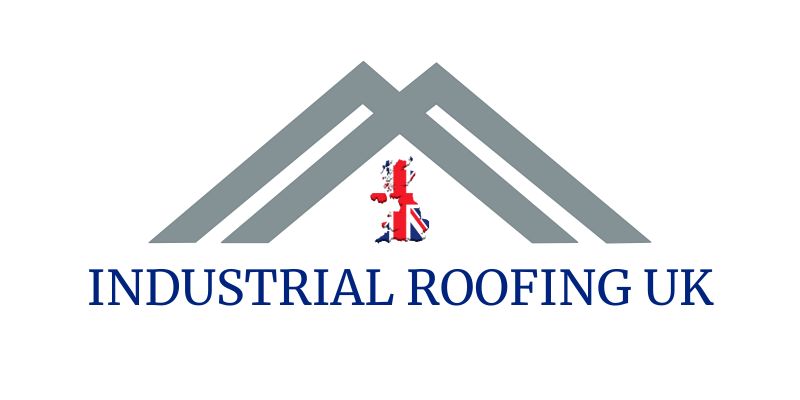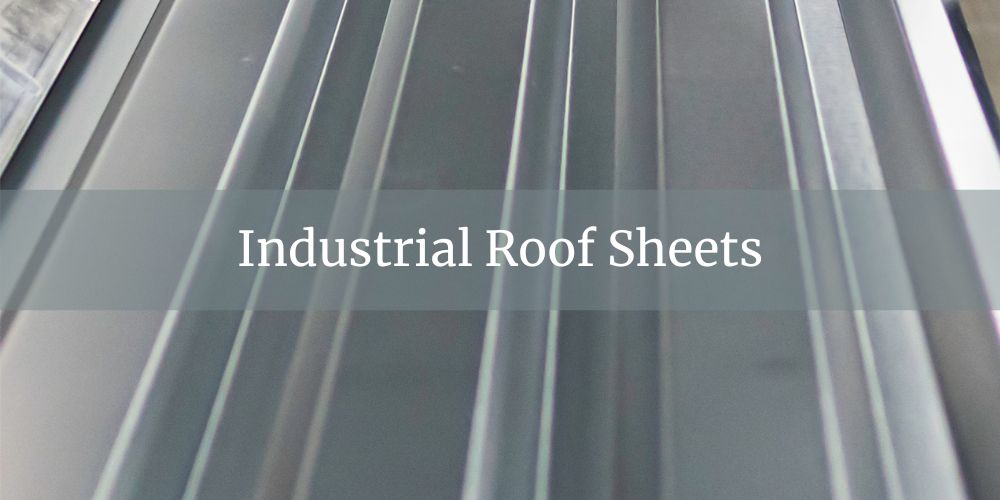Industrial roof sheets refer to large panels used to cover the roofs of industrial buildings. These sheets are typically made from materials like metal, plastic, or fibreglass and are designed to endure harsh environmental conditions and heavy loads. They provide durable, weather-resistant protection and can be tailored for specific performance characteristics such as insulation or fire resistance. Industrial roof sheets are vital for maintaining the structural integrity and efficiency of industrial facilities, ensuring they remain safe and functional.
Industrial Roofing UK specialise in the repair, coating, and replacement of industrial roof sheets across the UK. When dealing with industrial roof sheets, Industrial Roofing UK strive to make sure the solution is cost effective and long-lasting. We work with a variety of profiled metal and fibre cement sheets, addressing common issues such as corrosion, leaks, cracked panels, and aged fixings. Our services include targeted repairs to damaged sheets, protective coatings to extend lifespan and improve weather resistance, and full sheet replacement when the structural integrity of commercial or industrial buildings is compromised. Serving factories, warehouses, and production facilities nationwide, we deliver durable, compliant roofing solutions tailored to the demands of each site.
What Are Industrial Roof Sheets?
Industrial roof sheets are robust roofing materials specifically designed for use in industrial buildings such as factories, warehouses, and manufacturing plants. These sheets are typically made from durable materials like galvanised steel, aluminium, or fibreglass, selected for their strength and resistance to environmental stressors. According to the National Federation of Roofing Contractors (NFRC), industrial roof sheets are essential for providing long-lasting protection and maintaining the structural integrity of large industrial facilities.
The primary benefit of industrial roof sheets is their ability to endure harsh weather conditions, including heavy rain, strong winds, and extreme temperatures. They often come with coatings which enhance their resistance to corrosion and UV radiation, further extending their lifespan. The Building Research Establishment (BRE) notes high-quality industrial roof sheets can last up to 40 years with proper maintenance. Additionally, these sheets are designed to be lightweight yet sturdy, making installation easier and reducing the load on the building's structure.
Industrial roof sheets also offer excellent insulation properties, helping to regulate the internal temperature of industrial buildings and reduce energy costs. Studies from the Roof Coatings Manufacturers Association (RCMA) indicate using insulated roof sheets can significantly improve a building's energy efficiency. Investing in industrial roof sheets ensures reliable protection, energy efficiency, and long-term cost savings, making them a valuable component of industrial building infrastructure.
Have a question about an upcoming project?
What Are The Different Types Of Industrial Roof Sheets?
The different types of industrial roof sheets are corrugated metal sheets, standing seam metal sheets, polycarbonate sheets, and bitumen sheets. Each type is designed to meet specific needs and conditions of industrial buildings, offering distinct benefits in terms of longevity, weather resistance, and ease of installation. Metal roofing systems make up approximately 50% of industrial roofs in the UK construction industry.
- Corrugated Metal Sheets
- Standing Seam Metal Sheets
- Polycarbonate Sheets
- Bitumen Sheets
1. Corrugated Metal Sheets
Corrugated metal sheets are commonly used in industrial roofing due to their strength and durability. These sheets have a wavy pattern that enhances their structural integrity, making them resistant to harsh weather conditions and physical impacts. They are also lightweight and simple to install, which reduces labour costs and time. Corrugated metal sheets are often covered with materials such as zinc or PVC plastisol to provide additional protection against rust and corrosion. According to the Metal Roofing Alliance, corrugated metal roofs can last up to 50 years with proper maintenance. These roofing sheets are also adaptable and can be used for various applications, including warehouses, factories, and agricultural buildings. Their design allows for efficient water runoff, which helps prevent water pooling and potential leaks.
2. Standing Seam Metal Sheets
Standing seam metal sheets are known for their sleek appearance and superior weather resistance. These roofing sheets feature raised seams that interlock to create a watertight seal, ideal for preventing leaks. Standing seam roofs are typically made from aluminium or galvanised steel, providing superior durability and a modern look. They are also highly resistant to wind and thermal expansion, making them suitable for various climates. The seams are usually elevated above the roofing surface, which helps to keep water away from the fasteners, reducing the risk of leaks. Standing seam metal roofs can also be covered with protective layers such as PVDF (polyvinylidene fluoride) to enhance their resistance to UV rays and corrosion. According to industry data, these roofing systems can last over 50 years with low maintenance, making them a long-term investment for industrial buildings.
3. Polycarbonate Sheets
Polycarbonate sheets are a popular choice for industrial roofs needing natural light. These transparent or translucent sheets allow sunlight to penetrate, reducing the need for artificial lighting during the day. Polycarbonate is a strong, lightweight material that offers adequate impact resistance and UV protection. These roofing sheets are often used with other roofing materials to create skylights or light panels. Polycarbonate sheets are also fire-resistant and can withstand extreme temperatures, making them suitable for various industrial applications. They are easy to install and can be cut to fit specific roof dimensions. Additionally, polycarbonate roofing sheets are known for their flexibility and can be moulded into different shapes, allowing for creative architectural designs. According to the Building Research Establishment (BRE), using polycarbonate sheets can improve energy efficiency by reducing the need for artificial lighting and heating.
4. Bitumen Sheets
Bitumen sheets are composed of asphalt and fibreglass, providing superior waterproofing properties. These roofing sheets are commonly used in flat or low-slope industrial roofs. Bitumen roofing is known for its longevity and resistance to extreme weather conditions, including heavy rain and high winds. Additionally, bitumen sheets are relatively easy to install and maintain, making them a cost-effective option for industrial roofing. Bitumen sheets can be applied in various ways, including torch-down or self-adhesive methods, which provide flexibility in installation. They are also resistant to UV rays and can withstand temperature fluctuations without cracking. The addition of a mineral surface can further enhance their durability and aesthetic appeal. According to the National Federation of Roofing Contractors (NFRC), bitumen roofs can last up to 20 years with proper care, offering a reliable solution for industrial buildings.
What Is Involved In The Maintenance Of Industrial Roof Sheets?
Maintenance of industrial roof sheets involves regular inspections, cleaning, and minor repairs to ensure their long life and optimal performance. The specific tasks vary depending on the roof type, such as box profile sheets or other metal roofing options. Regular maintenance helps identify and address potential issues early, preventing more extensive damage and costly repairs.
- Regular Inspections
- Cleaning
- Minor Repairs
- Coating and Sealing
- Gutter and Drainage Maintenance
1. Regular Inspections
Regular inspections are crucial for maintaining the integrity of industrial roof sheets. These inspections should focus on identifying signs of wear and tear, such as corrosion, loose fasteners, and damage caused by environmental factors. Detecting issues early allows for timely interventions and repairs, preventing more severe damage. According to the National Federation of Roofing Contractors (NFRC), regular inspections can significantly extend the lifespan of roofing systems by up to 30%.
2. Cleaning
Cleaning is essential to maintain the functionality and appearance of industrial roof sheets. It involves removing debris, dirt, and organic matter from the roof surface to prevent deterioration and blockages in the drainage system. Regular cleaning helps preserve the roof's condition and prevents damage caused by accumulated debris. The Building Research Establishment (BRE) suggests routine cleaning can reduce the risk of leaks and structural damage.
3. Minor Repairs
Promptly addressing minor repairs is vital for the longevity of industrial roof sheets. This includes sealing leaks, replacing damaged sheets, and tightening or replacing loose fasteners. Regular maintenance of minor issues prevents small problems from escalating into significant damage, ensuring the roof remains in good condition. Timely repairs are a cost-effective way to maintain the roof's integrity and functionality.
4. Coating and Sealing
Applying protective coatings and sealants is an effective method to enhance the durability and weather resistance of industrial roof sheets. Coatings, such as liquid polyurethane, provide an additional layer of protection against corrosion and environmental damage. Sealing gaps and joints helps prevent water infiltration, extending the roof's lifespan. According to the British Coatings Federation, using high-quality coatings can add up to 20 years to a roof's life.
5. Gutter and Drainage Maintenance
Proper maintenance of gutters and drainage systems is essential to prevent water accumulation and potential leaks. Ensuring gutters and downspouts are clear and functioning correctly helps avoid water-related damage and preserves the roof's structural integrity. Regularly checking and cleaning the drainage system is a critical aspect of overall roof maintenance, contributing to the long-term performance of industrial roofing systems.


